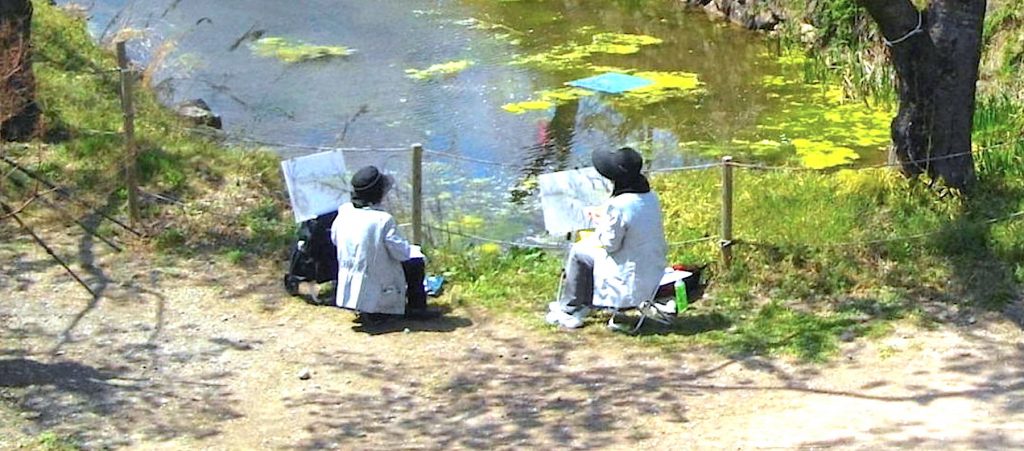
I realize that ‘artistry’ is a sloppy choice for a title. It’s a broad stroke which embraces many activities, from musical performance to jewelry making. But here, I’m using it in the narrowest sense, referring to painters, capturing with deft strokes what and how they see their world.
It might silly on the most superficial level to be “celebrating” something as anachronistic as painting. Ages ago, it was the only way to give a permanent visual record of a person’s appearance, a still life, a landscape, a battlefield, a coronation, a vision. But things have dramatically changed.
Now we have smart phones and digital cameras, technologically cranked up to always take perfect photos. We have dash cams, body cams, Go-Pros that capture everything in real time, not as stop-action stills but as streaming visual records of reality, as it happens.
Better yet — from some perspectives — we have software that can take all that imagery and transform it. Take a photo of that basket of fruit on your table. Process it and you end up with a Rembrandt or Van Gogh or Monet. Want a Titian? Import some angels and naked bathers into the photo you took at the dog park. Add Jesus or Mary or the Twelve Apostles. Looking for a Jackson Pollock? Easy. Just do your own digital drip painting while riding the Tilt-A-Whirl at Six Flags.
Congratulations! You’re an artist!
Want celebrity status? Photoshop yourself having dinner with Angelina Jolie or playing poker across from Christopher Walken in Las Vegas.
This creative “flexibility”, of course, applies not just to visual arts but across the board. There are apps for writing stories or entire novels. Apps for composing music. Apps for making up jokes, pick-up lines, compliments on your grandmother’s new hairdo.
What a wonderful world we live in, eh? Everyone is a creative genius, a star, the life of the party, admired by . . .
Uh . . . well, somebody. Anybody?
Is anyone paying attention?
You really have to wonder where this ends up. If everybody is capable of doing everything at the highest level, no one will stand out. No one will be special. No one will be admired for anything. Except maybe the huge variety of apps they have on their Galaxy or iPhone. And if someone gets a jump on you, hey, no problem. Just go to the app store, do a quick search, put in your credit card and voilà . . . you’re the new Beethoven or Hemingway.
Meaning . . . it’s not about what you actually do. It’s about what you can get done.
In a revealing aside, let’s look at the world’s glamor stage of wealth. There are a few names which are constantly in the news. Elon Musk, Jeff Bezos, Bill Gates, Steve Jobs and Apple Corporation. Elon Musk is the wealthiest person on the planet. He didn’t design, engineer, or make anything which created his fortune. Jeff Bezos doesn’t make anything either. He sells stuff. Bill Gates didn’t invent the computer or any of the software which runs on the PC. He didn’t even invent the graphic user interface which made him famous. He stole the “windows” GUI, the concept and code. Steve Jobs certainly didn’t invent the telephone. To be fair, he was the driver behind the smartphone revolution. But the technological breakthroughs — the grunt work — the actual design and building, were performed as work for hire by his employees. None of the “big names” actually innovated anything. What they did is create the entrepreneurial conditions for the innovations they are credited with. To be blunt about it, they are heralded as geniuses, on the world stage, for one reason. They each amassed huge piles of money. You have to ask: Is this what achievement looks like now? Is merit no longer related to talent, but purely a function of net worth?
So look at these members of my home town. Is it possible they somehow don’t know about all of the wonderful innovations we have at our fingertips? Are they stuck in some world that’s centuries old?
What's wrong with these people?

I’ll tell you what’s right with these folks. They understand that it’s what you do, not what you own or can buy, that’s fulfilling. That it’s the journey, not the destination, that sustains the soul and adds value to life.
It took me a long time to figure this out.
But I finally did.